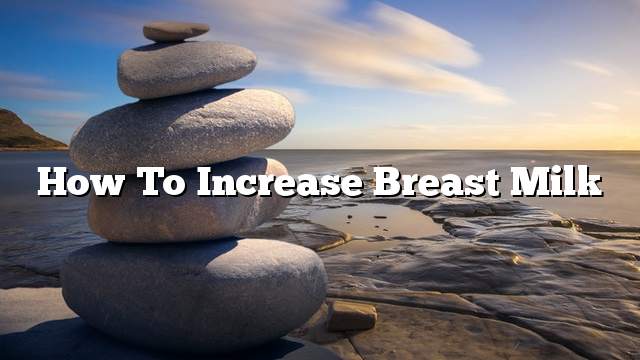Breastfeeding
Breastfeeding is the only staple food that the baby gets in the first six months of the wolves, and then gradually enters the food with breastfeeding until we reach weaning, but from the moment of birth, your baby needs to breastfeed continuously, without specifying or regulating the times or the number of meals, But sometimes most mothers wonder about the adequacy of the milk they have, and is it rich in what the child needs? Here, we show you how to increase the milk yield and how to keep it from deficiency or drought.
How to maintain milk and milk
- Breastfeeding the baby in the first hour of birth, to stimulate the milk hormone for production quickly, and benefit from breast milk produced by the breast in the first three days of birth, and is characterized by butter milk concentration of all minerals and vitamins and antibodies that increase the immunity of the body, Helps your child get rid of the yellow stuff and water in your stomach, protects your child from colic, and cleans the intestines.
- Relax during breastfeeding and give the baby enough time to breastfeed.
- Do not specify a period or time to breastfeed and give the child whenever he needs, and not whenever the mother has time to breastfeed.
- Eat balanced foods that contain all the nutrients, while keeping away from foods that increase body fat to maintain the ideal weight as much as possible.
- Eat natural juices that contain vitamins and minerals.
- Eat a diet containing fish twice a week.
- Eat dairy products from cheese and milk continuously.
- Exercise that increases body activity and regulates blood circulation.
- Feed the baby periodically from both breasts, so that they are fully discharged at each meal.
Foods that increase milk production
- The ring in all its forms and methods of preparation.
- Halawa Tahina.
- Sesame.
- Salmon.
- Brown bread.
- Honey.
- cream.
- Vegetables and fruits of all kinds.
Causes of dry milk
- Refrain from breastfeeding the baby in the first days of childbirth. Some mothers suffer from chest pain and some injuries due to lack of proper breastfeeding, which reduces milk production.
- Follow the wrong diet in the postpartum period directly.
- Take some medications that reduce the secretion of milk such as birth control pills.
- Stress and anxiety during breastfeeding, which is reflected on the child and refrain from breastfeeding because of his lack of comfort and safety, and recent studies have shown that the psychological state of the matter is felt by the child largely through breastfeeding and how to touch the mother and breathing, in this case the child refuses to breastfeed and when forced Therefore, he feels colic and pain in the intestines.
- Give the baby one breast feeding, which reduces the production of milk in the other breast and dry gradually, and affect the process of the outer shape of the breasts.
